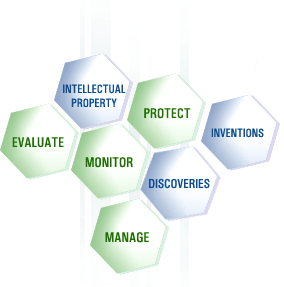|
 The NIH Office of Technology Transfer (OTT)
The NIH Office of Technology Transfer (OTT)
The NIH Office of Technology Transfer evaluates, protects, markets, licenses, monitors,
and manages the wide range of NIH and FDA discoveries, inventions,
and other intellectual property as mandated by the Federal Technology
Transfer Act and related legislation.
To accomplish its mission, OTT oversees patent prosecution and negotiates and monitors
licensing agreements. OTT performs similar functions for patenting and licensing
activities for the Food and Drug Administration (FDA), another component of the
Department of Health and Human Services (HHS).
Other major functions within OTT include the development of technology transfer policies for NIH
and with the other two major research components of HHS (FDA and the
Centers for Disease Control and Prevention
[CDC]) and the implementation of decisions by the Technology Transfer Policy Board.
To learn more about the NIH Intramural Research Program click here.
NIH and its Role in Technology Transfer
It is impossible to overstate the untapped potential that technology transfer represents.
To understand why, consider the many steps involved in medical breakthroughs.
Today, most important developments in medical science typically begin in laboratories,
such as the discovery of specific new biological molecules, processes, or pathways, or
innovative applications of existing knowledge. In most cases, these discoveries in and
of themselves have limited effect beyond meeting a fairly narrow research goal.
Their real impact for public health generally comes after several more significant
steps - including further R&D, testing, approval by appropriate regulatory bodies
(such as the FDA), manufacturing, and distribution.
OTT carries out its technology transfer mandate by retaining title to
inventions developed in NIH's intramural laboratories and licensing these inventions
to private entities to ensure use, commercialization, and public availability. In a
similar way, extramural recipients of NIH funds, such as universities, are allowed
to seek patent protection for inventions arising from their NIH-funded basic research
and license the rights to private entities to promote commercialization.
Over the last 15 years, NIH has executed thousands of
license agreements.
These licenses transfer NIH and FDA inventions to the private sector for further research and development and potential
commercialization that can lead to significant public health benefits.
At OTT, we're always open to ways to make technology transfer a more user-friendly process.
We are committed to seeing that the public has ongoing access to newer and more effective
health care products and procedures. Please
contact us if you have any questions
regarding any information provided within our website.

|